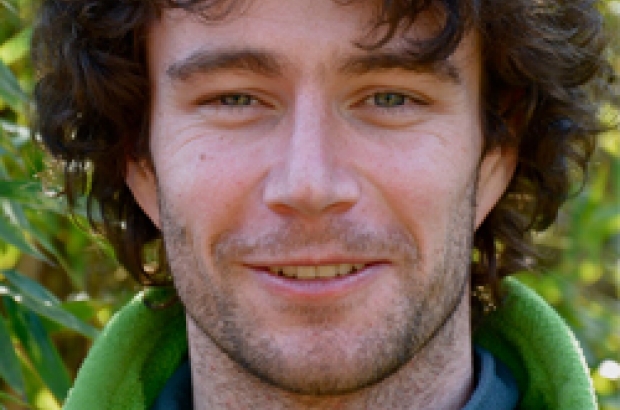- Daily & Weekly newsletters
- Buy & download The Bulletin
- Comment on our articles
Wage watchers: How much does a sport climbing instructor earn?
A net salary of €1400 is enough to let Tijl Smitz, 33, from Heverlee keep doing what he loves best.
What do you for a living?
I work as a freelancer in sport climbing combined with a few different things. I train youngsters and adults at the climbing club Hungaria in Leuven. I also coach the Belgian youth team in international competitions and training workshops as a professional sports coach with the Climbing and Mountain Sports Federation.
I also build routes in the Hungaria climbing gym and in competitions in other locales. To do this, I followed a training programme and internship to become an official route builder for the Belgian Commission for Competition Climbing. Finally, I also work as an editor for the Belgian Climbing Network, the largest website dedicated to climbing and mountaineering in Belgium.
What exactly is sport climbing?
Sport climbing is a specialisation that came from mountaineering (rock climbing). At first it was a way of training for mountain climbing. In sport climbing, you climb a route on a rock or indoor climbing wall without any tools to aid you.
Competition climbing has three disciplines: ‘speed’ (the winner is the one who climbs the fastest; the route is always the same), ‘bouldering’ (this refers to climbing difficult routes on three- to five-metre high walls), and ‘lead’ (this about who can climb the highest. The walls are some 18 metres high and the routes have a maximum of 65 movements). Lead climbing is the highest class of climbing: insight is important, movements can be estimated and ingenious solutions can be found for cases that at first sight seem unsolvable. The competitions are always on artificial walls and usually indoors.
Do you enjoy your job?
Enormously, it is my passion! I am constantly busy with climbing. Even in my free time, I’m skimming Facebook and YouTube for training ideas from top teams from all over the world.
How does Belgium rank in sport climbing?
Belgium stands pretty high internationally. Our youth team sits in the top five at the European level!
Do you participate in competitions?
No, I don’t do competitions (anymore). It’s a question of deciding between coaching and participating. I began climbing at 18, which is fairly late. Now I coach people who are better than me. But after practicing this sport intensively for 15 years, I have quite a lot of experience and I can bring people farther as a coach.
What do you think of your salary?
I’m happy that I can do what I love to do most and that I can get by with what I earn from it. In this sport, a lot revolves around volunteer work and until recently I did a number of my tasks as a volunteer. But over time, I’d like to see my income evolve a bit so I could begin to save and to build something.
There is not much money to be made in most sports. If our sport could lure in more interested practitioners and viewers, then this might evolve, but for the time being our competitions are free and watched by a couple hundred viewers. Right now, climbing and mountain sports are ‘booming’, so the context is gradually changing. The different federations are also working hard to build the future of climbing. Climbing was just adopted as a demonstration sport in the Youth Games in China.
How many hours do you work per week?
With training adults (10 hours), training youth (20 hours), designing routes (5 hours) and online editing work (3 hours), I work 38 hours per week. But there are a few ad hoc activities on top of that, such as meetings, organising events and coaching athletes from the climbing club at competitions.
Plus, as a professional sports coach, I guide seven or eight international competitions per year and at least two training workshops, which also require preparation work. And of course I myself am also climbing some six to 12 hours per week. So, yeah, I’m busy with climbing 24/7. (Laughs)
Would you change jobs to earn more money?
No, I wouldn’t know what else I’d do for work. I began working in the climbing sector in 2006 and want to work to create more opportunities in this sector instead of redirecting my career.
Do you save money?
No.
What is your biggest cost?
The rent on my apartment and the kilometres I put on my car, which is around 35,000 km per year.
Do you watch your money more now with the economic crisis?
I’ve always had to watch my money. In the climbing sector, the crisis isn’t really felt – the climbing gym is full every evening. That is probably because, besides being fun, healthy and social, climbing is also very relaxing. When you climb, you are completely focused on what you are doing, so you feel the stress just fall off of you.
What do you dislike spending money on?
Expensive cars, big houses and expensive restaurants.
What do you like spending money on?
On climbing and snowboarding vacations. I go climbing a lot in Austria, Spain and France.
What would you do if you won the lottery?
I would definitely keep doing what I do now, but I would have fewer financial worries. I would also sponsor the Belgian climbing team so that they’d have professional guidance and supervision. Right now there is really no well-developed structure for Belgians who want to participate in international competitions for adults. So the money would all stay within climbing. (Laughs)

















